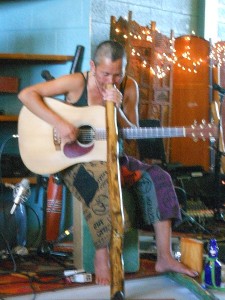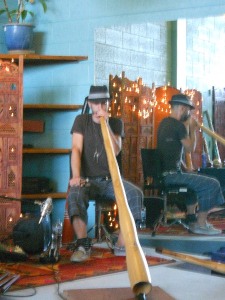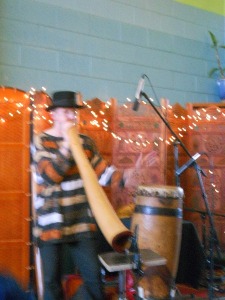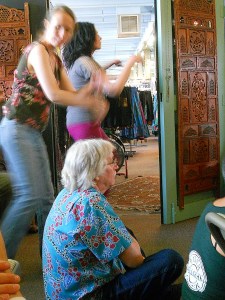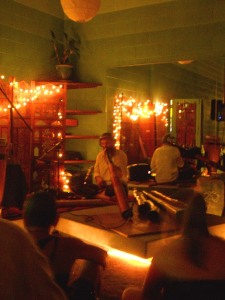Ondrej Smeykal, Didgeridoo Master & Friends
What an awesome show!
Can you believe it was FIVE hours?!!! I couldn’t either. There were social breaks between performers and sets, so we wiggled around and hugged old friends/met new ones, but… five hours! I couldn’t believe it when I turned my phone on.
We were transported.
Ondrej spoke briefly before he began. He’s very hushed, and even mic’d it was difficult with his accent and pitch to understand, but I did hear him describe the didgeridoo as “simple, complex, and exact. We forget about these things,” he went on, “but these instruments are here to remind us.” He talked about his “didge conversion,” the awe that a mere hollow tube can do and be this thing!
And then he played. WOW! When I heard him a couple years ago, it was an intimate house concert, acoustic. This time, it was still quite intimate but intricately amplified. It was totally different and… just amazing, that’s all. Amazing!
****
Leraine Horstmanshoff was first to play. I was glad to finally hear her. She’s well-known in the valley and I’m surprised it took so long to meet her after hearing so much about her. She was wonderful! Unique and female. Powerful, evocative, and emotional. She hadn’t brought any CDs, but I will get one at first opportunity. She mixed unexpected instruments – guitar, banjo (!), her voice (more than yelps and trills). She sang in the thing! (Beautiful voice; rich, unforced vibrato) It was tribal, feminine, human. Leraine also briefly demo’d The Micro, and Marko sold three on the spot. Thanks, Leraine!
Dan was next, and he’s just a hit. I already introduced you to him, so I won’t elaborate much except to say I like his new stuff, especially on his newer didge tuned to the gyspy scale. He was funny. “This is called ‘The Gypsy,'” he said of it, telling us why. “This is called ‘The Slugger,'” he said of another. “Not because of its harmonics but because…” He trailed off and threw the huge stick over his shoulder, taking the hitter stance.
Dan’s always interesting because he gets into the precision and mathematics of split didge manufacturing. He mentioned his association with Dr. Frank Geipel, the German engineer whose computer program he uses to achieve the exact specifications for each unique didge he dreams up and handcrafts (Computer Aided Didgeridoo Sound Design, CADSD). The audience loved that.
Stephen Kent added every imaginable percussive accompaniment, and some beyond imagination. He introduced each strange piece, explaining that he searches the world for unusual instruments. I loved his music. He talked about his didge conversion, which took place at The Valley of Winds in Australia, and played the piece that evolved from that night, on an authentic eucalyptus yidaki (a tribal name for didgeridoo) hollowed by termites. (That still blows my mind. This thing, this powerhouse instrument of music and meditation, is not man-made. It’s bigger than us. Makes you feel a “meant-to-be”ness about the world, though I think the universe, while loving, is more random than that.) I got the most satisfying, deep breath I’ve had in years. I have this weird thing where I can’t catch my breath. I have to talk myself off a ledge sometimes when I need that diaphragm-stretching breath and can’t get it. I got it!
Pithy British humor describes Stephen Kent. He was so fun! The man didn’t miss a beat! He was so quick and playful with a live audience. In the midst of all the laughter and joy, he talked at length about the plight of Aboriginal people and about elders, in general. My participation in Native American practices in recent years has deepened my connection to ancestors. I’d only ever felt connected to my own. Now I feel tied to all who live and who have. I believe that we have access to all consciousness. Everyone in that room felt it, and shared theirs with one another. It was love, magic, fun. You don’t look at the clock when you’re tapped into eternal time. 😉 Stephen closed with a traditional song wanting community participation. That felt good, though I think I’m the kid who could always be heard above the others in primary school, so gleeful am I.
Chad Butler, Stephen and Ondrej’s manager, spoke before each. He said, “Whatever the didgeridoo is going to become, it’s happening now.” He elaborated on his point that more and more people are coming to the didge, and the influence of the community is about to shift. There is power and purpose in what we care about. He talked about green and other global concerns and how the didge community seems to be in tune to those kinds of issues and yearns to be a force for change. He was very inspiring about the possibility for success. That’s how I feel. I just feel us “getting it.” Writing that is immediately followed by the question in my mind, “How can you say that?” But I feel it. I think this community is raising children and awareness and even money that will solve many current, urgent problems.
It was an uplifting reminder to act and speak for the planet and for patience with each other. And then Ondrej played.
Ondrej suggested we turn down the overhead lights. The only option was off. It removed us instantly from a room and took us to a place of simply being. He began with “the ocean” I wrote about before. It was really powerful amplified. That deep breath I got earlier kept rewarding me. I was relaxed and serene.
Then he exploded! Holy shit.
I find it remarkable sometimes that the didge surprises me so. I’m saturated with it, yet I can’t get enough. Five hours! Felt like two. Dance, laughter, connection, festival energy. And stupefying music! How do you even try to describe?
Meanderingly, I suppose. I really enjoyed this show.
OK! I’ll go back to practicing. Ten minutes a day, for the love of all that is holy! I tease. I don’t chide my lack of discipline so much as I celebrate a kick in the pants. I’m happily inspired and motivated anew. Didgeridoo!

